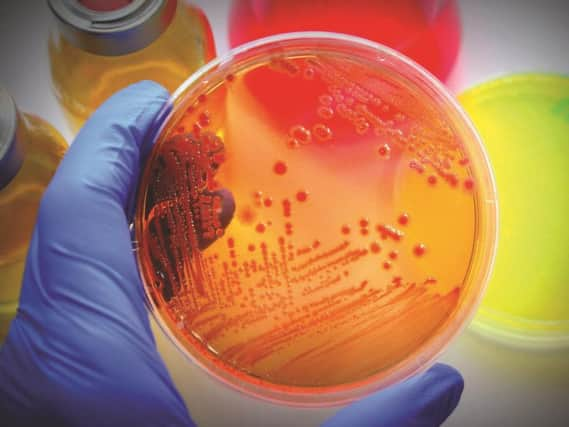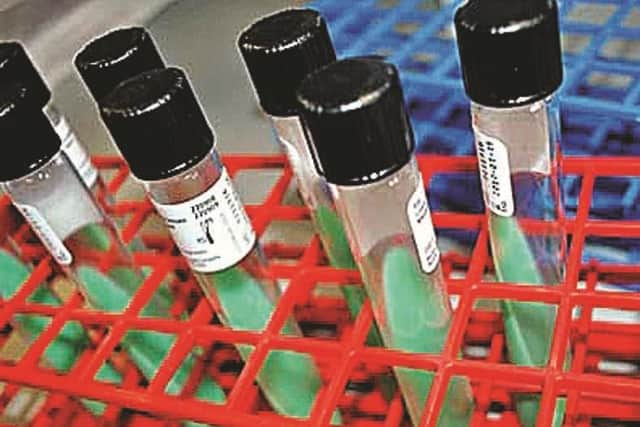Scottish firm heads charge in fight against drug-resistant infections


The UK Government claims that as a result 5,000 people die each year in the UK, and without the ability to fight off infections, routine medical procedures such as cancer treatments and joint replacements could become life threatening.
“You have probably heard of the growing problem of sepsis [infections] as a result of not having enough antibiotics,” says Dr Chris Woodall.
“We have been running out for years and by 2050 it is going to be a very serious problem.”


However, his microbiology company based in Robroyston, in the north of Glasgow, is supporting companies all over the world to develop and create new antimicrobial and anti-infective products, to fight the growth of bacteria and infections.
BluTest Laboratories was set up by Woodall and his wife Joanna, who comes from a background of successful entrepreneurs, in 2009 and is now one of Scotland’s globally-recognised experts in virus testing, supporting pharmaceuticals, biologicals and biocides.
Having experienced a record year for turnover and profit in 2018, the company is seeing a steady growth in the microbiology market, both in Scotland and across the world.
The type of work predominantly carried out at BluTest is the development and support of medical devices and antimicrobials. The work has previously received support from Scottish Enterprise and Innovate UK.
“They are the only products that tend to have the capability to kill microbes, so we cover anything that kills bacteria, fungi and viruses essentially,” says Woodall.
“We first ensure that we understand the needs of our client, then provide the best solutions and advice on the laboratory support that is required for them to meet their developmental aims, or the regulatory requirements for their product.”
This can be anything from anti-infectives, toothpaste and laundry detergents to healthcare products and industrial disinfectants.
“We do that to support regulatory submissions for those products because they need to be carefully regulated and we also support the development of new ones,” explains Woodall, who is also an honorary senior clinical lecturer of Medical, Veterinary and Life Sciences at the University of Glasgow.
“That is one of the main things we do, we help people generate new products that have the capability to be antimicrobial.”
The company has expanded over the years, moving from an incubator site at the University of Glasgow to a ten-laboratory Nova Business Park base in November last year.
The team has also grown from four to 15 and a half employees and is comprised of fully-qualified microbiologists whose activities are separated into microbiology and virology.
They attract contracts from across Europe, China, India, the US and Singapore to cover a range of tasks.
In the fight against the spread of viruses and infection, it is imperative that medical devices can be clinically sanitised for reuse.
“It is really important that when medical devices are reusable they are properly cleaned between use so you do not get the transmission of infection from each individual who has used it,” explains Woodall, who comes from a long line of business owners.
“We do cleaning and disinfection which is a laboratory study that enables us to demonstrate that a device can in fact be cleaned and disinfected between use.
“We also carry out disinfectant qualification, which is basically ensuring that the disinfectants used in the clean rooms where life science products are made are effective in doing the job they say they will.”
In Europe, BluTest supports the development of new products for a clinical-stage biotechnology company based in Zurich, Switzerland, SynDermix AG.
It develops medical products used to treat side effects of chemotherapy, diabetic ulcers and eczema, and has an anti-ageing skin product due to hit the market at the end of the year.
Despite upcoming political and economic uncertainties, Woodall believes these international links will continue to grow alongside Scotland’s life sciences sector which, he agrees, is in a good position to reach the Scottish Government’s £8 billion target for 2025.
Woodall points to Scotland’s strong academia as one of the key reasons for the sector’s success.
He says: “I think we are in a unique position because we have a really good source of high-quality life sciences graduates.
“Scotland has an established core of life sciences and biotechnology companies and is one of the largest centres for life sciences innovation in the UK, so all of that provides good prospects for the Scottish biotech industry.
“Basically, we have the infrastructure to attract significant international interests because of our ability to be very effective at life sciences in Scotland – and we are very good at it.”
To ensure that strength in the sector, the company provides financial support to microbiology PhD studentships at the University of Glasgow and technical support for those at the University of St Andrews, with funding from the Industrial Biotechnology Innovation Centre.
It works closely with the University of Glasgow’s dental school because of their expertise in biofilms, micro-organisms formed by yeast, bacteria or fungi that stick to wet surfaces and cover themselves in a slime as protection from antimicrobials and anti-infectives.
As many as 70 per cent of chronic wound infections are difficult to treat because of biofilms, according to Woodall. They also coat teeth and contribute to tooth decay.
But thanks to advances in technology and connectivity, the work of BluTest is likely to grow and link with more companies and organisations around the world.
“We continue to develop and expand our microbiology services so we are not just seeing growth but we are seeing development in what we do which would be in line with the development of the industry in general,” adds Woodall.
“It is a very important industry for the future in Scotland.
“From March 2019, it is difficult to predict how that will affect our business and there probably will be an impact, but we are trying to understand what that might be.
“Although when we started out, it was the start of a recession and we have only just come out of that recession, so we have only ever really known relatively hard times.
“We have seen a gradual steady growth, we have established an excellent reputation for the company and we enjoy working with all of our clients and supporting them in developing better products.”
Factfile
5,000 people die every year from infections caused by antimicrobial resistance in the UK, according to the UK Government
Microbiology is the study of micro-organisms including bacteria, viruses and parasites
Antimicrobials block the growth of harmful microbes and bacteria
Anti-infectives are drugs, including antibiotics, that combat infections
At your service
Services provided by BluTest include:
Microbiology contract research for the development of antimicrobials, anti-infectives, healthcare products and biocidal formulations to household and industrial disinfectants
Biocide efficacy testing to European standards against viruses, bacteria, fungi and mycobacteria
Product development for pharmaceutical medical device biocide for products such as surgical gloves and wound dressings
Disinfectant and medical device disinfection validation studies
Biofilm testing using advanced analysis techniques
For more information, visit www.blutest.com